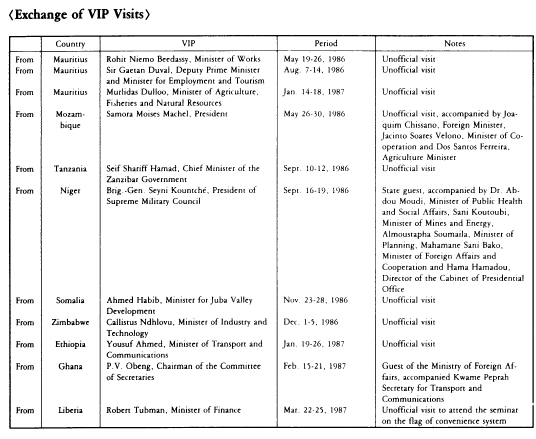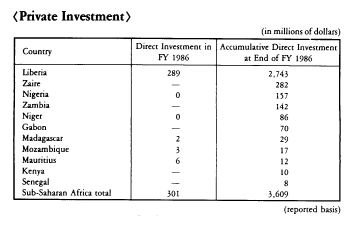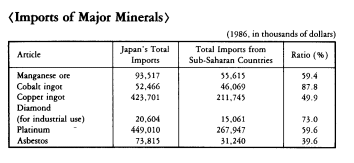
Section 8. Africa
(1) South of Sahara
There are now 45 independent countries to the south of the Sahara (constituting approximately one-third of the total U.N. membership) and they have no small influence on international affairs. Africa also plays an important role in the world economy for its abundant natural resources, including rare metals.
Most African countries, whose economic foundations are still weak, are faced with serious economic difficulties, such as structural food shortage, low rate of growth and snowballing external debts.
In view of the importance of Africa and its increasing role in the international community as well as Japan's international responsibilities in today's increasingly interdependent world, Japan has been promoting exchanges of people with African countries to enhance mutual understanding. Japan has also extended economic and technical cooperation in a wide range of areas in order to contribute to their socioeconomic development.
(2) Personal Exchanges
Japan welcomed Brig.-Gen. Seyni Kountche, President of Niger's Supreme Military Council, in September as state guest and P.V. Obeng, Chairman of Ghana's Committee of Secretaries, in February 1987 as guest of the Foreign Ministry. In May 1986, President Samora Moises Machel of Mozambique paid an unofficial visit to this country. A total of 20 ministerial-class VIPs visited Japan.
(3) Economy
(a) Trade
Japanese exports to sub-Saharan countries in 1986 increased by 5.3% from the previous year to 3,134 million dollars, while Japan's imports from these countries jumped by 21.5%, resulting in a slight excess of imports over exports for Japan.
By country, South Africa, Liberia, Nigeria, Kenya and Cameroon were the five biggest exporters to Japan, accounting for 73% of the total exports to Japan by the sub-Saharan countries. On the import side, South Africa, Zambia, Mauritania, Liberia and Ghana accounted for 85% of the total.
(b) Investment
Japan's outstanding direct investment in sub-Saharan Africa stood at 3,609 million dollars at the end of March 1986 on an authorization basis, accounting for 3.4% of Japan's total direct foreign investment. In fiscal 1986, investment in sub-Saharan countries jumped by 79.2% from the previous year to 301 million dollars, accounting for 1.4% of the total.
(4) Economic and Technical Cooperation
Japan has been trying to expand its assistance to Africa from the latter half of the 1970s with the share of Africa in bilateral ODA rising about 1.6-fold from 6.8% in 1975 to 10.9% in 1985. In terms of dollar-based absolute amount, Japan's aid to Africa leaped about 4.7-fold. In fiscal 1986, Japan strived to expand its assistance to Africa, centering on assistance in the food and agricultural fields, while respecting the U.N. Action Programme adopted at the U.N. Special Session on Africa in May 1986 and bearing in mind the need to help African countries achieve self-sustenance in food for the medium- to long-term. Specifically, Japan dispatched "African Green Peace Corps" to Senegal and Tanzania as part of the " Green Revolution for Africa," being proposed as a follow-up to the Bonn summit in May 1985 and extended Special Joint Financing with the World Bank's Africa Fund as in fiscal 1985 to support African countries' structural adjustment efforts. As a result, Japan's aid to sub-Saharan countries on a bilateral basis in 1986 came to $418.46 million, surpassing the previous year's level.
In view of developments seen in the South African situation, Japan sent an economic cooperation survey mission to Southern Africa in February 1987 as part of measures to step up aid to South Africa's frontline states suffering from economic difficulties.



(Note) Zero denotes an amount less than one million dollars.-denotes null.
